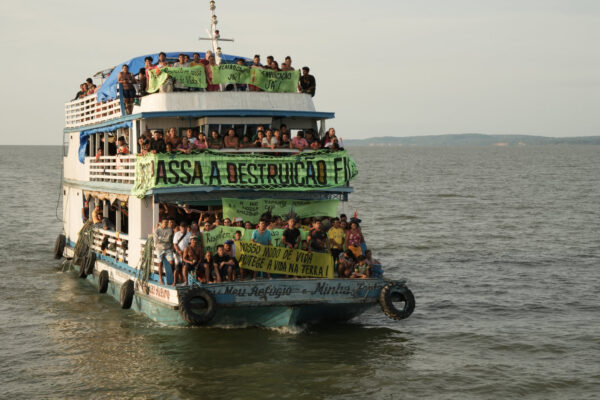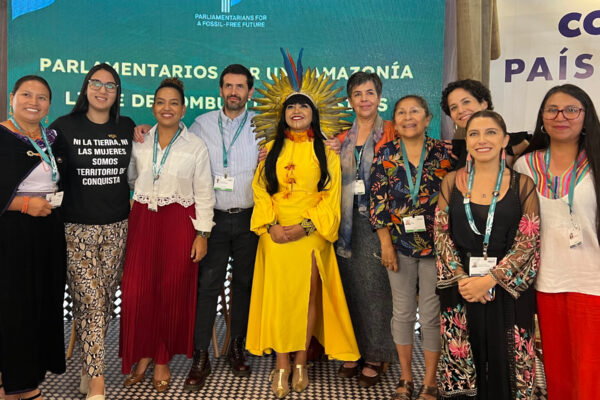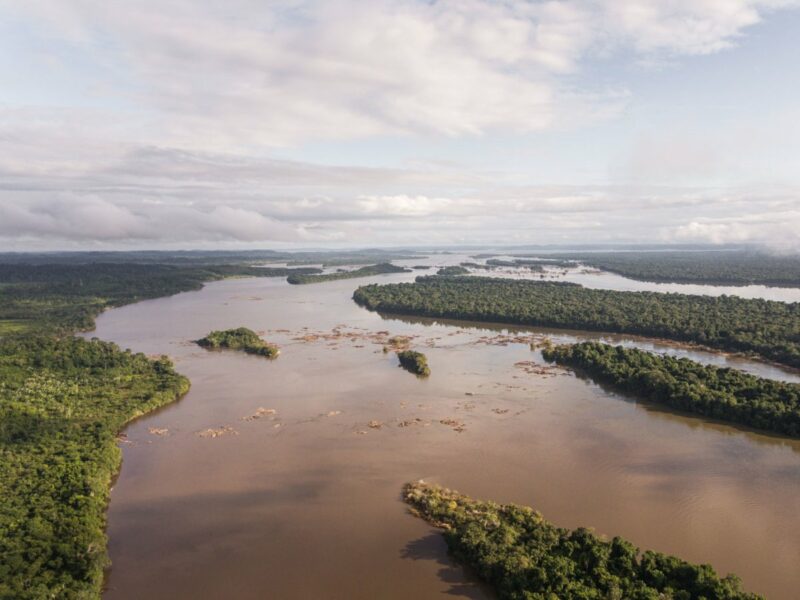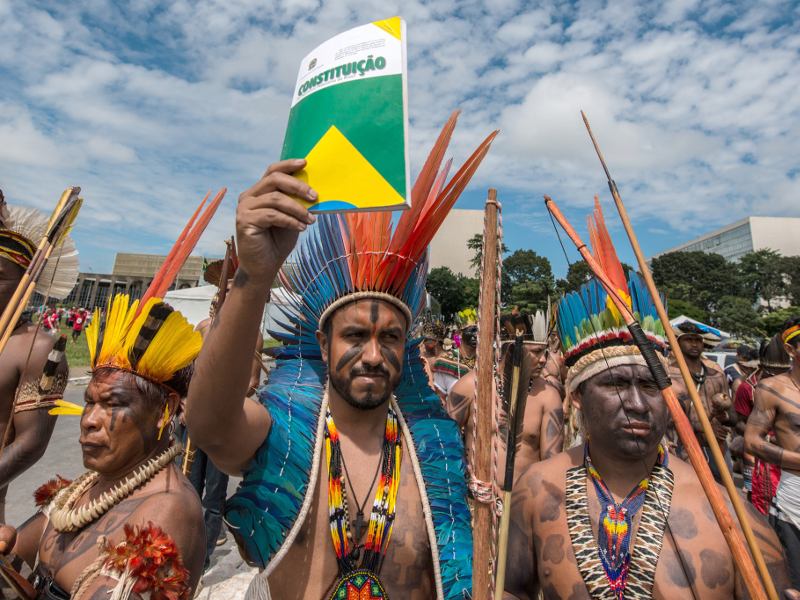
A report published this week by Amazon Watch reveals that six prominent Brazilian politicians – members of the bancada ruralista agribusiness lobby and all but one up for election in October – have been found guilty of serious environmental, economic,
and social crimes and offenses.
According to the report, they are leaders in a socio-environmental legislative onslaught on the Amazon that will be disastrous for its people and the national and global environment. Named in the report are Adilton Sachetti, Nelson Marquezelli, Dilceu Sperafico, Jorge Amanajás, Sidney Rosa and Alfredo Kaefer. All but one are running for a seat in Congress in the October elections; Sperafico has appointed his successor.
Commodities produced on their farms, or distributed by their ruralist allies, are being exported to leading U.S. and European companies. Prominent companies buying their products include the soft drinks manufacturers Coca Cola (U.S), Schweppes (Switzerland) and Eckes Granini (Germany) and the poultry producer Wiesenhof (Germany).
The ruralist politicians documented in the report have been accused of – and in some cases found guilty of – serious crimes including breaches of labor laws (especially conditions analogous to slavery), infringement of environmental regulations, and corruption (including loan default and tax evasion).
The report also found that one firm that was closely associated with one of the politicians – despite its inclusion on the Brazilian government’s “dirty list” of companies utilizing slave labor – has been certified for its sustainable and labor-friendly policies by the Rainforest Alliance, an NGO.
The Amazon Watch report raises the question of whether importing nations and transnational companies should be employing stricter criteria for selecting Brazilian trading partners, especially avoiding those with serious criminal records and those promoting the destructive ruralist agenda. It also raises concerns regarding the motivations of ruralist legislators who stand to profit handsomely via their farms and commodities firms by pushing a legislative agenda favorable to agribusiness.
Amazon Watch is supporting initiatives by indigenous movements to get importers of Brazilian commodities to take responsibility for the way those goods are produced. Luiz Eloy Terena, a lawyer for Brazil’s Association of Indigenous Peoples (APIB), told Amazon Watch: “We indigenous peoples know that large banks and companies from outside of Brazil … are supporting the ruralistas in their efforts to destroy indigenous and traditional communities and our forests and rivers. We have taken this information to the European Parliament to demand the boycott of commodities produced on indigenous lands.”
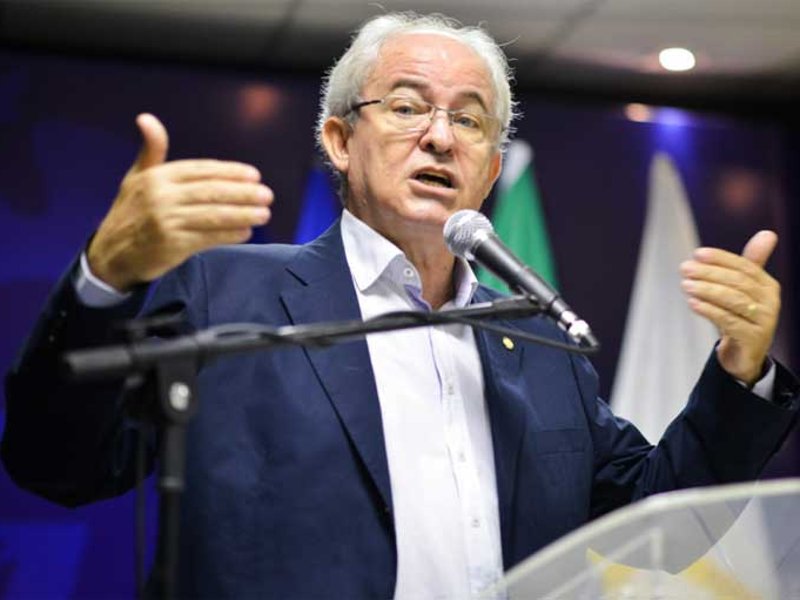
Case study 1: Adilton Sachetti
Federal deputy Adilton Sachetti, who figures prominently in the Amazon Watch report, has been in and out of the courts for over a decade, accused of crimes ranging from non-payment of debts, to larceny and embezzlement.
He was born into a large family from Santa Catarina, a southern Brazilian state. The family migrated north to the town of Rondonópolis in Mato Grosso state as agribusiness moved into the Cerrado, Brazil’s vast savannah.
The first brush with the law by Sachetti’s family firm – called Agropecuária Sachetti – came in 2004 when some of Brazil’s most powerful economic actors (including large banks, such as Unibanco and Santander, and multinational agribusiness companies, such as Bunge, Monsanto and Syngenta) took the firm to court to demand payment of debts owed by the firm. At the time, Agropecuária Sachetti was managed by Adilton. Unibanco managed to get the courts to confiscate one property that had been provided as loan collateral.
This default on loan payments was perhaps understandable because Brazilian agribusiness was then going through a serious economic and environmental crisis. A company spokesman said that the unpaid debts were largely the result of the 2005-2006 drought, “the most serious in the history of Mato Grosso.”
But the malpractices didn’t end with the drought. In 2010, Bic Bank went to court accusing Sachetti of the theft of 600,000 kilograms (660 tons) of cotton lint that had been offered as collateral for a bank loan.
By then, Sachetti was facing 53 charges in Mato Grosso courts, arising from both Adilton Sachetti’s personal behaviors as well as actions by the family firm. According to the Mato Grosso Justice Tribunal, at least 21 charges stemmed from Adilton’s personal conduct as president of AGECOPA (the State Agency for the Execution World Cup Projects in the Pantanal), then responsible for administering R$3 billion (US$725 million).
In 2014, a judge ordered the confiscation of Sachetti’s personal assets worth R$160,000 (US$38,700) for non-payment of taxes. And in 2018 came what was perhaps the most serious accusation: members of the Supreme Federal Tribunal (STF), Brazil’s highest court, decided unanimously that there was sufficient evidence for Sachetti to be tried for “appropriating public goods in benefit of companies linked to his family.” The alleged wrongdoing occurred when he was mayor of Rondonópolis between 2006 and 2008. The case is still pending.
Despite the numerous crimes for which Adilton Sachetti and his family firm have been charged and found guilty, the main large-scale farm within the Sachetti group, Agropecuária Céu Azul, has been registered as “fit” to export to the European Union by the Brazilian Agriculture Ministry.
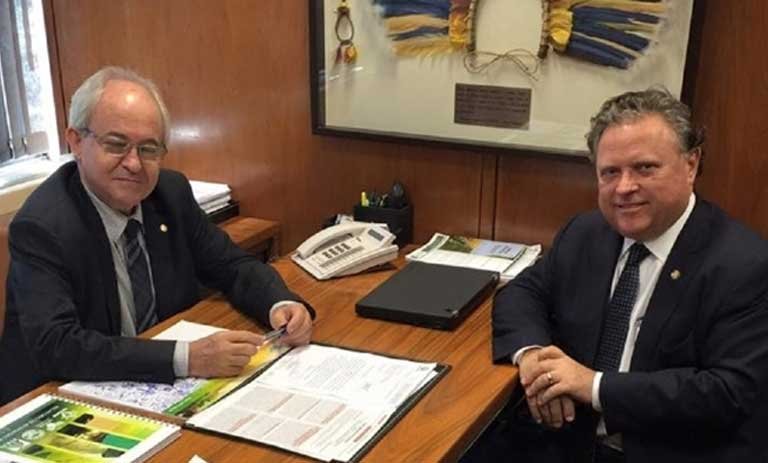
The Sachetti / Maggi / EU connection
A rundown of Adilton Sachetti’s long-time friendships, business connections, and political career sheds a light on the interlocking relationships between agribusiness and the bancada ruralista – the agribusiness lobby that began pushing a harshly anti-environmental and anti-indigenous legislative agenda in the Brazilian Congress starting in the early 2000s.
One of those key long lasting associations: Adilton Sachetti has been a friend and ally of current Agricultural Minister Blairo Maggi since childhood. And the two have intermingled their affairs for decades.
For example, the Sachetti group doesn’t export directly from Agropecuária Céu Azul and its other soy plantations, but instead distributes through Amaggi, one of Brazil’s largest commodity traders, owned by the Maggi family, in which Agriculture Minister Blairo Maggi, formerly known as “the Soy King,” is a key player.
The German company Mega Tierernährung, a subsidiary of PHW-Gruppe, a leading German poultry producer, imports large amounts of Brazilian soy from Amaggi. PHW-Gruppe owns the leading Wiesenhof brand, which is responsible for almost half of the chickens raised and slaughtered in Germany. Those chickens are largely fed on Brazilian soy.
Wiesenhof told Mongabay that the soymeal it uses to feed its chickens meets the standard of Pro-Terra, which is one of the leading sustainability certifications for soy products. While that is a fact, it is also potentially true that some of the soy fed to those European chickens could come from Sachetti’s farms and company, with their long history of criminal charges; however, at present, detailed tracing of supply chain origins is very difficult, a problem which environmentalists say needs to be rectified.
Another Sachetti/Maggi connection: In 2004, when Agropecuária Sachetti went bankrupt due to the farming crisis, it was Eraí Maggi, Blairo’s cousin, who bailed Adilton out via a five-year partnership. Since then, Sachetti has been widely seen as advancing the Amaggi company’s agenda.
Aside from his business interests, Sachetti has occupied key political positions: in 2006, he was elected mayor of Rondonópolis in Mato Grosso, where Amaggi had its headquarters. While Sachetti was mayor, Amaggi increased its investment in his district. But when Sachetti failed to be re-elected in 2008, Amaggi moved its headquarters to Cuiabá, apparently in reprisal.
Sachetti returned to politics in 2014 when he was elected a federal deputy (standing with the PSB, the Brazilian Socialist Party). Blairo Maggi, himself, was a senator at the time, a position he occupied until appointed agriculture minister in May 2016 by President Michel Temer, who replaced impeached Dilma Rousseff.
Investigations carried out by Repórter Brasil revealed that in his 2014 congressional campaign, Sachetti received electoral funding from rural agribusiness producers who had been found guilty of illegal deforestation by Brazil’s environmental agency, IBAMA.
The best-known of Adilton Sachetti’s campaign donors is Eraí Maggi, who took over the “King of Soy” title – the biggest soy farmer in the world – from cousin Blairo Maggi. Another contributor was Eraí’s brother-in-law, José Maria Bortoli. Both are members of the Grupo Bom Futuro that owns 36 large Mato Grosso soy farms, and both figure in IBAMA’s list of farmers caught committing environmental crimes. Another two Sachetti funders – Romeu Froelich and Roland Trentini – were fined by IBAMA for illegal forest clearance.
After his 2014 win, federal deputy Sachetti quickly became a leading member of the bancada ruralista agribusiness lobby. In his first congressional speech in June 2015, he made it clear that he was in the legislature to promote agribusiness interests. He stressed the contribution made by his home state of Mato Grosso, the country’s leading agricultural producer, to Brazil’s economy: “While Brazil ended 2014 with a trade deficit of almost US$4 billion, Mato Grosso chalked up a surplus of about US$14 billion in the same period,” he said.
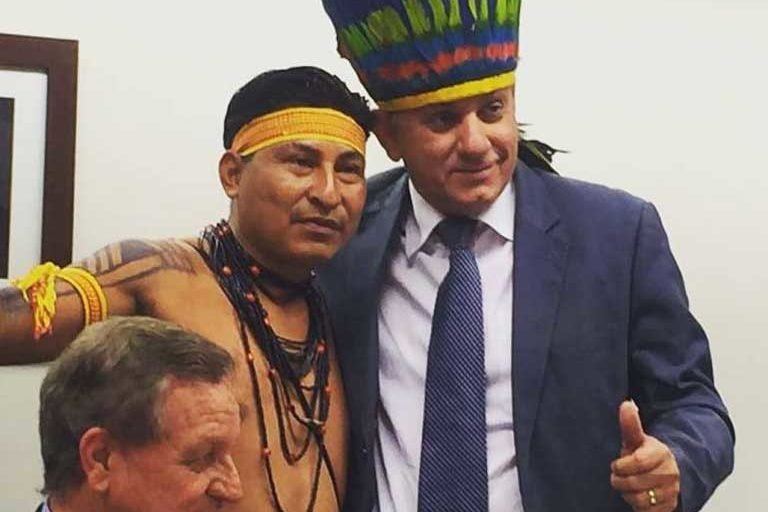
Sachetti’s legislative record
Sachetti has never hidden his conviction that Brazil’s indigenous population is hindering the nation’s agribusiness sector. In this first speech, he lamented the long time it was taking to pave the BR-158, the 4,000-kilometer (2,500-mile) highway running south from the Amazon state of Pará, and a key commodities export route.
One reason the paving was taking so long, he maintained, was a 130-kilometer (80-mile) detour around an indigenous reserve. Touching on a theme that would characterize later speeches, he said that indigenous people don’t need land, but rather require social welfare: “Their main problems are infantile malnutrition, illness, alcoholism, suicide and even hunger,” he said.
Sachetti became coordinator of the influential Infrastructure and Logistics Commission of the Parliamentary Farming Front (FPA), a body set up by the ruralist lobby. He used this position to campaign for bills that would limit the lands held by indigenous communities and to promote the expansion of agribusiness infrastructure – including the construction of roads, railways, ports and industrial waterways.
He is an outspoken advocate of PEC 215, a proposed constitutional amendment that would take away the administrative branch’s final word on indigenous land demarcation, shifting it to Congress. In practice, this would reduce the role of FUNAI, the indigenous agency, making it far easier for the ruralist lobby to prevent indigenous communities from acquiring legal rights over their ancestral lands. PEC 215 is still making its way through Congress.
Sachetti has also become skilful at using dissident Indians – unhappy with the increasingly strident stance adopted by some leading indigenous organizations – to promote the cause of agribusiness. He brought a dissident indigenous delegation to Congress to testify in favor of lifting a current ban on constraints that prevent commercial agribusiness from working within indigenous reserves. The Indians received a standing ovation from the ruralist lobby when they called for authorization to plant soy on their land.
At times, Sachetti’s tactics have backfired. One man, Ubiratan de Souza Maia, an ally that Sachetti and the agribusiness lobby tried unsuccessfully to shoehorn into the important job of coordinating land licensing within FUNAI, was later found guilty of illegally renting land on an indigenous reserve to soy farmers and ordered to pay compensation.
Industrial waterways
Sachetti has been particularly diligent in boosting projects important to Blairo Maggi – particularly the conversion of the Amazon’s great rivers and tributaries into industrial waterways to transport soy and other commodities. The Maggi family stands to earn gigantic profits in doing so: in 2017, Hermasa, Amaggi’s shipping company, transported a record volume of soy – 4 million tons – on Amazon rivers.
Last December, Maggi shared a photo with his social media followers of a new ship that can push barges down navigable Amazonian rivers. The vessel, called the Sabino Pissolo, is an empurrador, (literally a “pusher”), and one of the most modern craft in Hermasa’s fleet. Operating on the Madeira River, this empurrador can move up to 25 barges, carrying a total of 50,000 tons of soy, in a single journey; it would take 1,200 trucks to carry the same load. “It’s worth calculating how much diesel we are saving and how much wear-and-tear on the roads we are avoiding,” wrote Maggi.
But today the only Amazonian rivers able to transport goods in this way are the Amazon’s main trunk, the Madeira and the Tapajós, downstream of the port of Miritituba. For the network to be extended, extensive construction needs to occur, building dams and reservoirs, locks, canals and deep channels, to eliminate rapids and shallow waters on many rivers.
In the process, considerable damage would be done to aquatic life, to forest inundation and soil sedimentation patterns, and to the traditional and indigenous fishing hamlets lining the streams. As a result, many riverine communities, along with biologists and environmentalists, are fiercely opposed.
Authorization has not yet come for these Amazon industrial waterways, but Sachetti continues to play a key role to make it happen, pushing bills that would permit construction to begin. He has put forward three bills that would create seven industrial waterways. He justified his bills in the Chamber of Deputies this way: “Brazil has great rivers, longer and bigger than any U.S. or European river. So why can’t we take advantage of them?”
One of the acts, PDC 199/2015, would convert the Tapajós, Teles Pires and Juruena rivers into industrial waterways. Making the Juruena River navigable for barges would be of particular benefit to Grupo Bom Futuro, owned by Amaggi, which has several major farms within 200 kilometers (120 miles) of the river.
The close relationship already existing between agribusiness and the bancada ruralista may well grow stronger under the next Brazilian national government, with the agribusiness lobby expected to be even more powerful in Congress after the October elections.
Adilton Sachetti, himself, is running for Maggi’s former Senate seat, an election Sachetti is expected to win comfortably. Also, most observers believe that Blairo Maggi, the most powerful figure in Brazilian agribusiness, will continue as agriculture minister no matter who wins the presidency.
Mongabay contacted Adilton Sachetti and Blairo Maggi for their reaction to the information presented in the Amazon Watch report. When the article went to press, they had not replied.
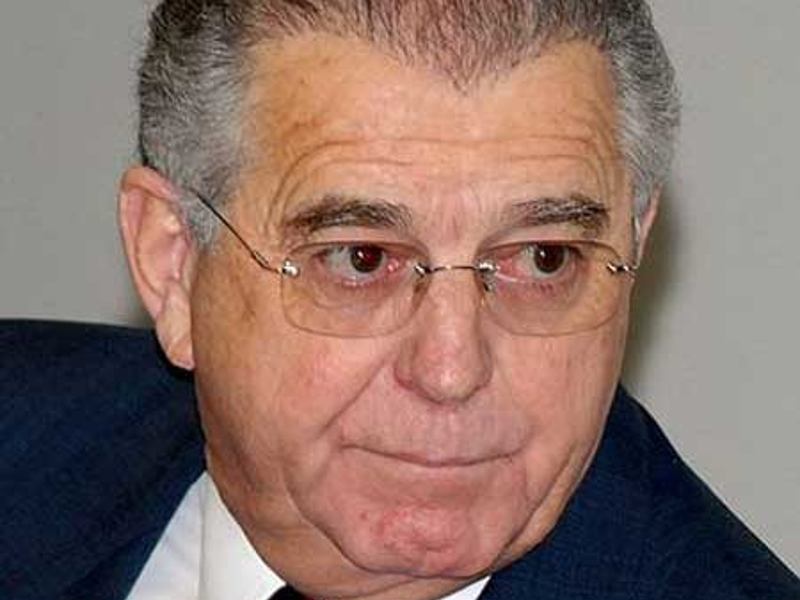
Case study 2: Nelson Marquezelli
Other ruralist deputies enjoy close links with agribusiness. Nelson Marquezelli owns large farms along with a company that distributes beer and soft drinks made by the huge AmBev company, a subsidiary to the Belgian multinational, Interbrew. Marquezelli, a federal deputy from São Paulo state since 1991, is standing for re-election this October.
Known as “the oranges deputy,” Marquezelli is outspoken over his role in Congress defending the interests of citrus producers, particularly Sucocitrico Cutrale, a giant firm owning five orange juice-processing plants in São Paulo state, along with many large scale orange plantations. Cutrale supplies one third of the orange juice sold on the world market.
The barely literate company founder, José Cutrale, began life selling oranges in a street market. Renowned as a tough negotiator with clients and suppliers, he formed a company and turned it into one of the world’s biggest orange juice makers.
When José Cutrale died in 2004, Marquezelli declared: “I have been elected four times as federal deputy by the people of São Paulo state in the [electoral] segment created by José Cutrale. I am the product of the ideas and work of José Cutrale … José Cutrale represented for us advancement, progress and inclusion in the international market of this hugely important commodity [that is, orange juice] produced by humble farmers, at times illiterate, in the interior of São Paulo and elsewhere in Brazil.”
But Marquezelli was not always a fan of Cutrale. In 2000 he sold his oranges to Citrosuco, an independent company and Cutrale competitor, but eventually the two companies reached an agreement, reportedly with the help of Marquezelli. After that, Marquezelli began receiving electoral funding from Cutrale. The sector then went through a rapid consolidation process. Today just three companies control 80 percent of orange juice production in Brazil. They’ve been repeatedly accused of forming a cartel.
Cutrale today is run by José Cutrale’s son, José Luis Cutrale, the “King of Orange Juice.” In 2015, he figured in the list, drawn up by Forbes magazine, of the richest people in Brazil, with a fortune of R$8 billion (US$1.9 billion). He has received various honorary awards from the Brazilian American Chamber of Deputies and taken part in diplomatic missions abroad.
But many Brazilians don’t view Cutrale warmly. The company has repeatedly been found guilty of breaking labor laws, with seasonal workers on its orange farms held in unsatisfactory conditions. In all, Brazil’s labor ministry, through its regional monitoring units (Gerências Regionais do Trabalho), found the company guilty of 90 labor legislation infringements between August 2012 and February 2015. As a result, Cutrale was ordered to pay compensation of R$300,000 (US$72,500).
Brazil’s Landless Movement (MST) has frequently clashed with Cutrale as well. In 2009, it occupied Fazenda Capim a large orange plantation in São Paulo state. Cutrale claims to own this farm, but the MST says that it is public land unlawfully grabbed by the firm. After it marched in, the MST cut down 7,000 orange trees, planting instead a staple food crop of feijão (beans). This action was filmed by military police and shown in Congress, causing a furore. Eventually, the MST families were forced out, after losing their case in court.
In 2014, the MST occupied for the 14th time another Cutrale farm – Fazenda Santo Henrique – also in São Paulo state. According to the MST, Cutrale grabbed this land illegally as well and lacks valid land titles. The MST wants the land turned into an agrarian reform settlement. Once again, the MST families were forced to leave.
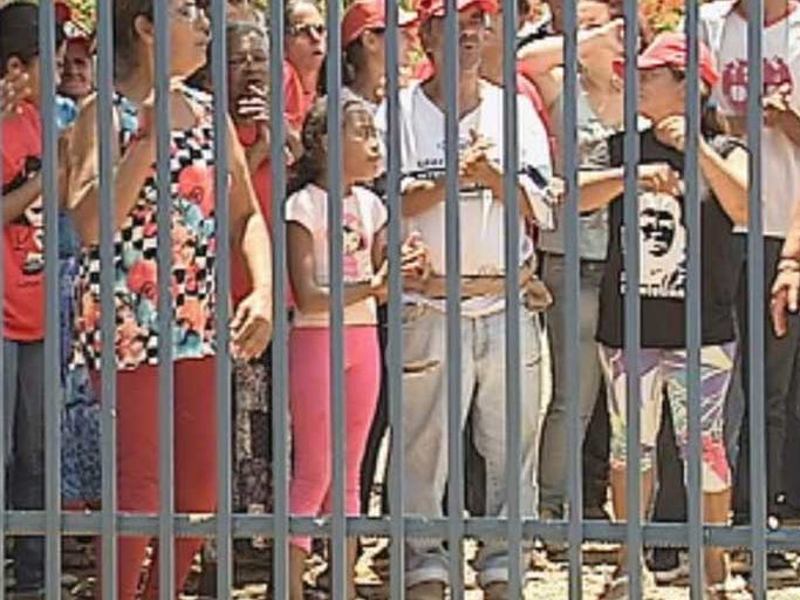
Working conditions analogous to slavery
The greatest controversy surrounding Cutrale – which has contributed significantly to Nelson Marquezelli’s election – involves labor conditions. In 2017 and 2018 Cutrale was included in the Brazilian government’s “dirty list” of employers found guilty of holding workers in conditions analogous to slavery.
Despite this, earlier this year, Cutrale was awarded one of the world’s most prestigious socio-environmental certificates, the Rainforest Alliance’s “green frog” seal. The Rainforest Alliance, based in New York, is a leading international NGO that works to conserve biodiversity and ensure sustainable livelihoods.
A product stamped with a green frog is meant to assure consumer confidence that the commodity so labelled has been manufactured in a way that promotes environmental sustainability and social equality. This seal is vitally important for Cutrale: the European Union requires this certificate before it authorizes imports.
The issue has resulted in an international controversy: Imaflora, a Brazilian NGO that issues its own sustainability certificate and usually works in conjunction with the Rainforest Alliance, said that it could not support the NGO’s decision to award the seal to Cutrale. The Rainforest Alliance was forced to find another body – the Biodynamic Institute (IBD) – to hand over its award, divisiveness that had never happened before.
The Rainforest Alliance issued a press release in which it explained its green seal award decision: “The Rainforest Alliance does not certify companies, rather we certify farms and plantations that comply with the requirements set forth in the Rainforest Alliance Sustainable Agriculture Standard.” The NGO says that Cutrale landed on the “dirty list” due to problems the labor ministry had documented on Cutrale’s Vale Verde and Portal farms in Minas Gerais state. But, says Rainforest Alliance, the farms it certified are located in Araraquara in São Paulo state, where slave labor conditions have not been found.
For IBD, this explanation sufficed: “From our point of view, each farm is a different unit because it has its own manager, human resources manager, and so on,” said Luís Henrique Witzler, an IBD director. Imaflora sees things differently. Luis Guedes Pinto, its manager for farming certification, said that the firm’s being on the “dirty list” should be sufficient to disqualify Cutrale, wherever the slave labor is found.
Cutrale exports to some of the world’s leading companies: Coca Cola (U.S.A.), Schweppes (Switzerland) and Eckes Granini (Germany).
Coca Cola responded to the Amazon Watch report, saying that, “we strive to protect human rights and promote environmental sustainability across the entire value chain. As such, we expect our suppliers to abide to our Sustainable Agriculture Guiding Principles and our Supplier Guiding Principles..” In addition, “We are encouraged with the progress made by our supplier in Brazil to improve sustainability at all levels. In fact, Cutrale recently received SAI-FSA verification for 100 percent of the orange farms they own (59 percent silver and 41 percent gold level). And they continue to work with all of their suppliers to ensure compliance with all environmental and labor laws, at a minimum. None of Cutrale’s oranges are grown in the Amazon, and the orange sector has been increasing productivity while reducing the total planted area in recent years.
“Still, with nearly 5,000 orange growers in the states of Sao Paulo and Minas de Gerais alone, we know there is more to do, and we will continue engaging with the orange sector overall to produce concrete solutions for the benefit of all orange workers and citrus communities in Brazil, regardless of their location or who they sell their product to,” concluded Coca Cola in an emailed statement.
Mongabay contacted Nelson Marquezelli, and Schweppes for a comment on the Amazon Watch report. As of the time the article went to press, no response had been made.
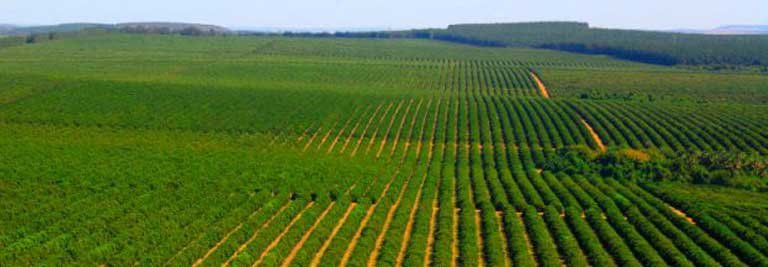
The need for more investigation, supply chain diligence
This article surveys just some of Amazon Watch’s detailed findings. Among others figuring in the report is Alfredo Kaefer, a federal deputy for Paraná state who is running for re-election. He raises chickens, with some of his production exported to Europe and Canada. Kaefer has allied himself with some of the most powerful members of the ruralist bloc. Enmeshed in a spate of financial irregularities, Kaefer has been accused of the illegal formation of a gang to benefit his company, Diplomata. This firm was also involved in an animal cruelty scandal in which starved chickens resorted to cannibalism. His company is part of the Globoaves group which exports chicken products to the Dutch companies Van Aerde Food, Ferdinand Zandbergen, Kühne & Heitz, and Jan Zandbergen.
Another politician described in the report is Jorge Amanajás, who has been a powerful player in the Amazonian state of Amapá since his election to the State Assembly in 1998. He is now Amapá’s Secretary of Transport and is running for a seat in the Senate. Amanajás has close ties with the paper pulp company, Amapá Florestal e Celulose (Amcel), a subsidiary of Japan’s Nippon Paper Industries, which links him to irregularities ranging from rural violence to land grabbing and illegal deforestation. Federal Prosecutors have filed 13 lawsuits against the company.
Amanajás grows eucalyptus and exports the wood chips through Amcel, which sells them to the German energy generating and trading company Uniper (owned by Fortum Corporation, a Finnish company).
Another federal deputy named in the Amazon Watch report is Dilceu Sperafico, who has decided not to stand for re-election but to name his successor. He has shares in the family firm Sperafico Agroindustrial, in which the Swiss mining giant, Glencore, bought a controlling share in 2008.
Sperafico is a leading member of the ruralist lobby and in 2017 got caught up in the Lava Jato “Car Wash” corruption scandal, which forced him to withdraw temporarily from politics. Sperafico Industrial exports soy lecithin, a derivative of soy which is used in health products which claim to reduce cholesterol. Importers include Solae Europe owned by DuPont (U.S.A.) and Lccico (Germany).
What becomes clear after studying this report is that members of the bancada ruralista agribusiness lobby in the Brazilian congress have been involved in questionable and illegal business practices, which include environmental, social, and economic crimes and injustices – a fact of which Brazilian voters may want to be aware.
Also, ruralists who support legislation that could profit themselves and their companies, while harming the environment and indigenous communities, raise serious ethical questions about commodities exports, supply chain oversight, and whether transnational companies are doing enough to monitor Brazilian suppliers.
Christian Poirier, of Amazon Watch, believes foreign consumers of Brazilian commodities must begin taking responsibility for the role they play: “As a U.S.-based organization, Amazon Watch fully recognizes our own country’s outsized role in climate change and human rights abuses,” he told Mongabay. “As part of that, we believe that Northern consumers must recognize how their choices may enable the ruralistas‘ abhorrent attacks on indigenous land rights and environmental protections that safeguard an irreplaceable region that is critical to our collective survival. Once we understand what’s at stake, the global community must respond.”


